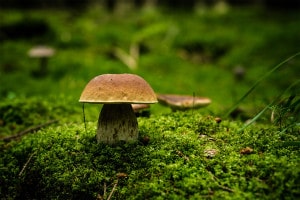Picking the medicines of tomorrow
When mycologists from very different backgrounds combine their skills to discover the medicines of the future: the story of a collaborative adventure at the Center for Functional and Evolutionary Ecology (CEFE).
 Searching for mushroom-derived drugs to treat neurodegenerative diseases: this is the quest that brings together Sylvie Rapior and Franck Richard (University of Montpellier) and Jean-Michel Bellanger (Inserm). Three mycologists with radically different profiles...
Searching for mushroom-derived drugs to treat neurodegenerative diseases: this is the quest that brings together Sylvie Rapior and Franck Richard (University of Montpellier) and Jean-Michel Bellanger (Inserm). Three mycologists with radically different profiles...
“Mycologists ecosystem”
“Mycology encompasses an infinite variety of professions,” explains Sylvie Rapior. “We form an ecosystem of mycologists!” she jokes...
At the start of the process are Sylvie and her team of chemists. They are responsible for extracting molecules from selected fungi: it is this cocktail of molecules that will be tested on living organisms.
This is where Jean-Michel Bellanger takes over. Passionate about mycology, this geneticist and biologist had the idea of testing these molecules on nematodes (C. elegans). This tiny transparent worm, barely a millimeter long, is a model organism often used in molecular biology. "It allows us to reproduce the characteristic signs of Parkinson's disease. And thus to identify the possible presence of neuroprotective molecules that could treat this disease."
Open collaborations
All that remains is to turn to an ecologist: a specialist in fungal communities, their evolution, and their interaction with their environment. "Franck Richard provides a comprehensive understanding that allows us to identify areas where we are likely to find a particular species," says Sylvie Rapior. But also to shed light on the links between the concentration of active molecules and the natural environment, "two intrinsically linked parameters, because chemistry plays a key role in the insertion of a fungus into its ecological niche," explains Jean-Michel Bellanger.
While cooperation between these different specialists is working perfectly, they themselves now aspire to more open collaborations. What's next on the horizon? Ethnomycology, where specialists in the humanities will be able to propose new avenues of research. But also the development of increasingly active networks with amateur mycologists.
“The collaboration between knowledgeable amateurs and skilled laboratories guarantees that we obtain accurate data. We want to benefit from the contributions of these excellent observers, but also provide them with practical assistance: for example, by giving them access to powerful molecular biology tools,” concludes Franck Richard.
36th edition of the mushroom and autumn plant fair
October 24 and 25 at the Faculty of Pharmacy in Montpellier: a trade show organized by the Hérault Society of Horticulture and Natural History. The program includes: the main mushrooms used in dietary supplements: presentation, use, and precautions for use.